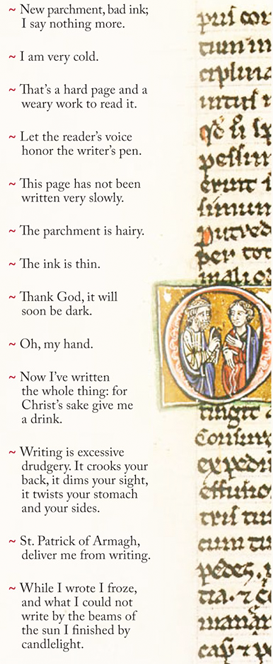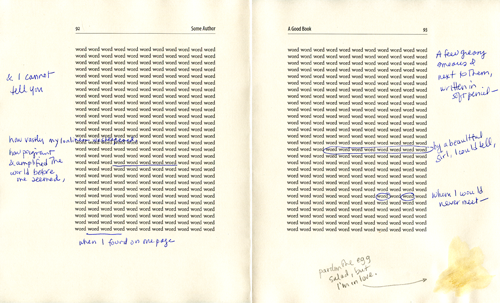 This week’s word reminded me of a post on Brain Pickings that I had meant to write about here on my blog… a collection of complaints monks scribbled in the margins of illuminated manuscripts, from an article in the Spring 2012 issue of Lapham’s Quarterly. (The post has links to a few other book related subjects as well.)
This week’s word reminded me of a post on Brain Pickings that I had meant to write about here on my blog… a collection of complaints monks scribbled in the margins of illuminated manuscripts, from an article in the Spring 2012 issue of Lapham’s Quarterly. (The post has links to a few other book related subjects as well.)
![]() To the left are examples of the things monks carp about. And this Google image search will provide you will plenty of other examples, both written and sketched.
To the left are examples of the things monks carp about. And this Google image search will provide you will plenty of other examples, both written and sketched.
![]() I was pretty sure I couldn’t top these — with the double whammy of being both carping and bookish. Despite that, I kept looking at images of old manuscripts, and I decided to pursue marginalia in some form for this week.
I was pretty sure I couldn’t top these — with the double whammy of being both carping and bookish. Despite that, I kept looking at images of old manuscripts, and I decided to pursue marginalia in some form for this week.
![]() I spent some time reading, especially What I Really Want Is Someone Rolling Around in the Text, Sam Anderson’s riff on marginalia and its importance to reading (his own reading habit at least).
I spent some time reading, especially What I Really Want Is Someone Rolling Around in the Text, Sam Anderson’s riff on marginalia and its importance to reading (his own reading habit at least).
![]() And then I found Billy Collins’ poem Marginalia, which starts out
And then I found Billy Collins’ poem Marginalia, which starts out
Sometimes the notes are ferocious,
skirmishes against the author
raging along the borders of every page
in tiny black script.
If I could just get my hands on you,
Kierkegaard, or Conor Cruise O’Brien,
they seem to say,
I would bolt the door and beat some logic into your head.
and ends
Yet the one I think of most often,
the one that dangles from me like a locket,
was written in the copy of Catcher in the Rye
I borrowed from the local library
one slow, hot summer.
I was just beginning high school then,
reading books on a davenport in my parents’ living room,
and I cannot tell you
how vastly my loneliness was deepened,
how poignant and amplified the world before me seemed,
when I found on one pageA few greasy looking smears
and next to them, written in soft pencil-
by a beautiful girl, I could tell,
whom I would never meet-
“Pardon the egg salad stains, but I’m in love.”
And I knew I’d found my project for this week. I laid out a generic book page spread, with the text “word word word…” repeated over and over. And I used Collins’ poem as the marginalia. Here’s the spread with the end of the poem… (read the entire poem here.)

Next up: catechize, v; To instruct orally by means of questions and answers.

it looks like this project found you!